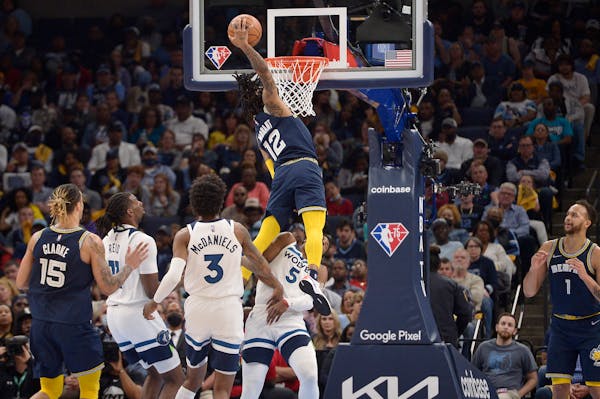MEMPHIS – The Timberwolves were down one point during Game 5 as the clock ticked away. Fewer than 30 seconds remained Tuesday night in the critical game, with the best-of-seven Western Conference series against the Grizzlies tied at two apiece.
The Wolves had the ball and a chance to retake the lead despite frittering away another double-digit advantage in the fourth quarter to Memphis.
The Wolves built up the best offense in the league based on a rhythmic, free-flowing offense that requires pace and ball movement. But on this possession, everybody was just standing around as D'Angelo Russell stared down Desmond Bane. Russell worked his way into the mid-range, but he never shook Bane, and just before the shot clock expired, Russell put up a contested shot that didn't come close.
That possession wasn't an outlier. The Wolves offense in late-game situations recently has been anything but rhythmic. More like out of tune. Even after a Game 4 victory, they lamented the execution down the stretch. They didn't correct the problem in time for Game 5, and ended up losing 111-109 at FedEx Arena.
"You see it. We always do that at the end of the game," Anthony Edwards said. "That's just, that's us. We'll figure it out."
Edwards tied the score with 3.8 seconds left with a three-pointer from the right corner, but made an ill-fated attempt to steal the ball on Ja Morant's game-winning layup with one second remaining. The Wolves don't have any more margin for error facing elimination in Game 6 on Friday at Target Center.
The Wolves tend to get bogged down in isolation on offense. Some of that can be because a player such as Edwards might have a favorable match-up, and the rest of the team just wants to get out of the way.
But the Wolves pride themselves on ball movement and preventing the ball from getting "sticky."
That type of isolation ball runs counter to how they play offense most of the rest of the game.
There's a natural tendency in a close game to transform an offense into that mode as singular possessions become more important.
"The game is going to slow down in certain ways, but you still got to go early, you got to attack, pick up your decisionmaking within the possession," coach Chris Finch said before Game 5. "It doesn't mean you don't use the clock smart."
By that, Finch means a possession doesn't have to end early in the shot clock. A possession can still contain movement and still last deep within the 24-second clock.
The isolation basketball also keeps the Wolves from getting the ball into the hands of Karl-Anthony Towns, Edwards and Russell all on one possession and making the defense react to how they're playing off each other.
"We wanted to get away from the [isolation], wanted to get some movement off the ball," Finch said. "We were able to get a few good looks there."
On the possession before Russell's shot, the Wolves were trying to set Towns up near the free-throw line, like they did to win a game against the Knicks in New York earlier in the season. But the pass to Towns ended in a turnover. Edwards was able to get some decent looks out of isolation, but many possessions as the Wolves gave away the lead ended without a good shot. The Wolves took heat from TNT's "Inside the NBA" crew for their shot selection.
"You can run a free-flowing offense, but we got to work on it," Russell said. "We got to practice it and then it's a mentality shift throughout the game. During the game, you play, play, play and then at the end of the game it comes down to executing and getting what you want and taking away from what the defense is trying to make you do."
Too often, the Wolves played right into the Grizzlies' hands in those situations, by only keeping the ball in one player's hands.
"It's a lot of 'I want the ball,' 'D-Lo want the ball,' 'KAT want the ball,' " Edwards said. "Once we figure it out, we're going to be all right. We gonna watch the film with coach [Wednesday] to figure it out."






